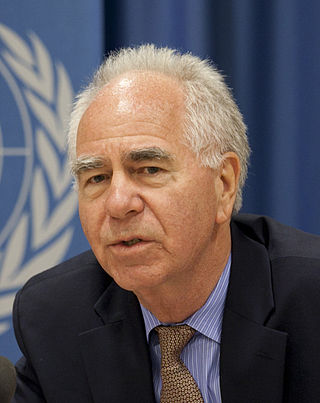
The University of Oslo is a public research university located in Oslo, Norway. It is the oldest university in Norway and consistently considered the country's leading university and one of the highest ranked universities in the Nordic countries. Originally named the Royal Frederick University, the university was established in 1811 as the de facto Norwegian continuation of Denmark-Norway's common university, the University of Copenhagen, with which it shares many traditions. It was named for King Frederick VI of Denmark and Norway, and received its current name in 1939. The university was commonly nicknamed "The Royal Frederick's" before the name change, and informally also referred to simply as Universitetet.

The National Institute of Mental Health and Neuro-Sciences is a medical institution in Bangalore, India. NIMHANS is the apex centre for mental health and neuroscience education in the country. It is an Institute of National Importance operating autonomously under the Ministry of Health and Family Welfare. NIMHANS is ranked 4th best medical institute in India, in the current National Institutional Ranking Framework.

Are Holen is a Norwegian psychiatrist and psychologist, and professor of psychiatry at the Faculty of Medicine at the Norwegian University of Science and Technology. He specializes on stress psychiatry, and has done scientific research on meditation.
Military psychiatry covers special aspects of psychiatry and mental disorders within the military context. The aim of military psychiatry is to keep as many serving personnel as possible fit for duty and to treat those disabled by psychiatric conditions. Military psychiatry encompasses counseling individuals and families on a variety of life issues, often from the standpoint of life strategy counseling, as well as counseling for mental health issues, substance abuse prevention and substance abuse treatment; and where called for, medical treatment for biologically based mental illness, among other elements.

Dr. Neil Boothby is a psychologist and former US Government special advisor and senior coordinator to the USAID administrator on Children in Adversity, and former director of the Program on Forced Migration and Health at the Columbia University Mailman School of Public Health. Currently, he is the founding Director of the Global Center for the Development of the Whole Child at the University of Notre Dame. His research focuses on the psychosocial consequences of organized violence on children. As a senior representative of UNICEF, UNHCR, and Save the Children, he has worked for more than 25 years with children in crises in Africa, Asia, Latin America, and Eastern Europe and is an internationally recognized expert and advocate for children affected by war and displacement. He has received numerous awards for his work on behalf of war-affected children, including the Red Cross International Humanitarian of the Year Award, the Mickey Leland Award, the United Nation's Golden Achievement Award for Social Services, and Duke University's Humanitarian Service Award.
Nora Louise Ahlberg is a Norwegian psychologist. She was Professor of Psychology at the University of Oslo and Director of the Psychosocial Centre for Refugees and later Director of the Norwegian Centre for Migration and Minority Health, a government agency that is now part of the Norwegian Institute of Public Health.

Margunn Bjørnholt is a Norwegian sociologist and economist. She is a research professor at the Norwegian Centre for Violence and Traumatic Stress Studies (NKVTS) and a professor of sociology at the University of Bergen. Her research has focused on financial institutions, management and working life and later on gender equality, migration and violence. She has also worked as a consultant, a civil servant, served as an expert to the European Commission and been president of the Norwegian Association for Women's Rights.
Lars Weisæth is a Norwegian military psychiatrist. He is Research Professor Emeritus at the Norwegian Centre for Violence and Traumatic Stress Studies, Professor Emeritus of Disaster Psychiatry at the Institute of Clinical Medicine at the University of Oslo and a lieutenant-colonel and former chief psychiatrist of the Norwegian Armed Forces Medical Service.
Kristin Skjørten is a Norwegian criminologist. She is a research professor at the Norwegian Centre for Violence and Traumatic Stress Studies (NKVTS) and a professor II of the sociology of law at the University of Oslo Department of Public and International Law. Skjørten is an expert on violence and abuse in close relationships, child custody, the Convention on the Rights of the Child and children's rights.
Trond Heir is a Norwegian psychiatrist and military physician. He is a Research Professor at the Norwegian Centre for Violence and Traumatic Stress Studies and Professor II of Psychiatry at the University of Oslo Institute of Clinical Medicine. He is an expert on psychotraumatology, epidemiology and public health. He was a member of the crisis team in the aftermath of the 2011 Norway attacks against a youth camp at Utøya and against the central government departments, and has carried out research on psychological trauma in the aftermath of the attacks.
Odd Arne Tjersland is a Norwegian psychologist. He is a Professor of Clinical Psychology at the University of Oslo and a Research Professor at the Norwegian Centre for Violence and Traumatic Stress Studies. He is an expert on psychological treatment of children, youth and families, and has published many books and articles on child abuse and violence in close relationships.

Nora Sveaass is a Norwegian psychologist, and an expert on refugees, human rights violations, and psychological consequences of torture and violence as well as treatment and rehabilitation of victims of torture and violence. She is Professor of Psychology at the Department of Psychology of the University of Oslo. She served two terms as one of the nine members of the United Nations Committee against Torture from 2005 to 2013, after being nominated as the joint candidate of the governments of the Nordic countries. She did not stand for reelection in 2013; however, in 2015 she was elected as a member of the United Nations Subcommittee on Prevention of Torture, and she is the only member to have served on both committees.
The Department of Psychology at the University of Oslo is the oldest and largest research institute and educational institution in psychology in Norway. It is Norway's main research institution in clinical psychology, cognitive psychology, developmental psychology, personality psychology, and social and cultural psychology, and one of the main research environments in neuroscience. The institute is located in the Harald Schjelderup Building adjacent to Oslo University Hospital, Rikshospitalet in the Gaustad area of Oslo; the building is shared with parts of the Faculty of Medicine, while Oslo University Hospital occupies surrounding buildings. The institute's alumni include two Nobel laureates, Edvard Moser and May-Britt Moser.
Siri Thoresen is a Norwegian psychologist and an expert on military psychology. She is a Research Professor at the Norwegian Centre for Violence and Traumatic Stress Studies. Her research focuses on psychological trauma as a result of war, catastrophe and terrorism, including psychological trauma in military personnel, and on sexual abuse.
Grete Anita Dyb is a Norwegian psychiatrist and terrorism researcher. She is a research professor at the Norwegian Centre for Violence and Traumatic Stress Studies and a professor in child and adolescent psychiatry at the University of Oslo Institute of Clinical Medicine. She has carried out research on psychological trauma and been involved in clinical work with children and adolescents exposed to sexual abuse, violence and disasters, and has in recent years directed a research project on the effects of the 2011 Norway attacks. She is President of the International Society for Traumatic Stress Studies (2015–2016).

Jon-Håkon Schultz is a Norwegian educational psychologist and researcher on violence, terrorism and crisis psychology. He is a Research Professor at the Norwegian Centre for Violence and Traumatic Stress Studies and Professor of Educational Psychology at the University of Tromsø.
Stefan Priebe is a German-British psychologist and psychiatrist.
Arne Sund was a Norwegian military psychiatrist. He "established Norwegian military psychiatry as leading within NATO" and is regarded as the "founder of the research field of disaster psychiatry."
Nils Johan Lavik was a Norwegian psychiatrist and Professor of Psychiatry at the University of Oslo. He was known for his work on psychological trauma among refugees.
Edvard Hauff is a Norwegian psychiatrist and Professor Emeritus of Psychiatry at the University of Oslo. He is known for his research on psychological trauma, forced migration, immigrants' mental health and global mental health. He spent years in Cambodia and is credited with building a psychiatric health service in the country.









